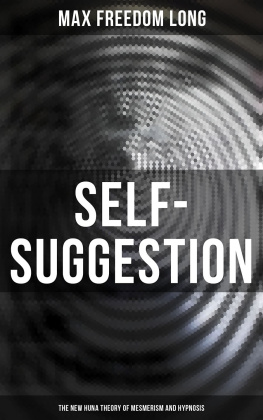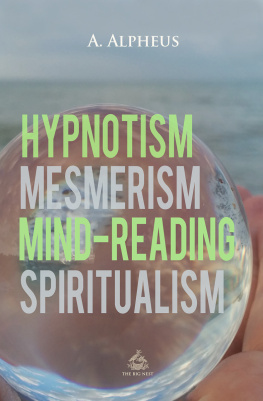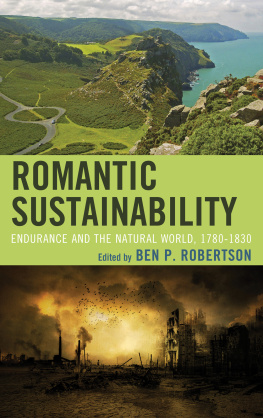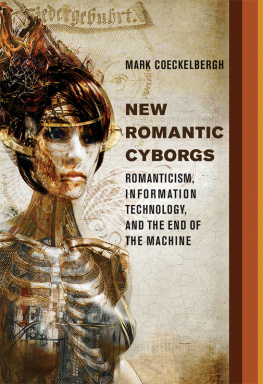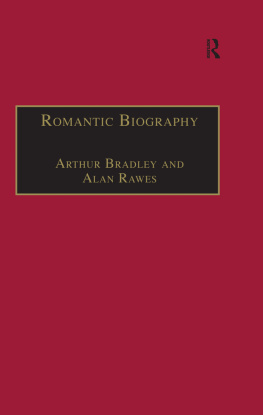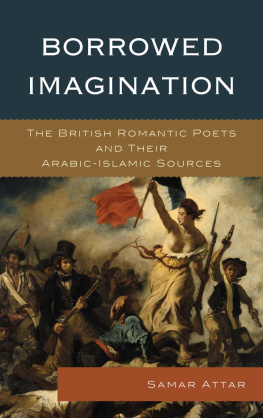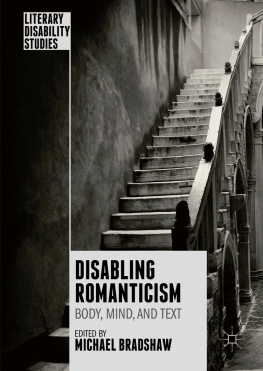About the Author
Anne DeLong is Assistant Professor of English at Kutztown University in Kutztown, Pennsylvania, where she teaches courses in nineteenth-century British literature and womens studies. Dr. DeLong is co-editor of The Journal of Dracula Studies. She also serves on the editorial board of Romantic Women Writers Reviewed. Her recent publications include a critical edition of Marie Corellis 1887 novel A Romance of Two Worlds and an online annotated version of Dracula.
Acknowledgments
This book reflects the provocative insights of several discerning readers in its early stages as a dissertation at Lehigh University. I am particularly indebted to my dissertation director, Elizabeth A. Dolan, for her feedback and encouragement. Rosemary Mundhenk, Alexander Doty, and Norman Girardot all gave generously of their time to read and comment on several drafts. Special thanks to Dina DeLong, with whom countless energetic conversations helped to clarify my arguments.
I am also indebted to the P.E.O. (Philanthropic Educational Organization) Sisterhood, both for the generous Scholar Award that funded my London research and for their friendship and support. Id also like to acknowledge the staffs of the Bodleian Library at Oxford University, the British Library, the Wellcome Library for the History and Understanding of Medicine, and Lehigh Universitys Linderman and Fairchild-Martindale Libraries, particularly the Inter-Library Loan staff. And, of course, the Lehigh University English department, for giving me the precious gift of time in the form of a dissertation fellowship.
Finally, warmest thanks are due my personal musesJimmy, Jake, Erika, and Momfor their patient support and unconditional love.
Bibliography
Armstrong, Isobel. The Gush of the Feminine: How Can We Read Womens Poetry of the Romantic Period? Romantic Women Writers: Voices and Countervoices. Eds. Paula R. Feldman and Theresa M. Kelley. Hanover, NH: UP of New England, 1995, 13-32.
Avena de Valdiere, Cesare. La Prima Musa Clio. Ed. George Baldwin. London, 1802.
. La Prima Musa Clio. Ed. George Baldwin. London: Gul. Bulmer & Co, 1805(?).
. La Prima Musa Clio, Or, The Divine Traveller; exhibiting a series of writings obtained in the extasy of magnetic sleep. Trans. George Baldwin. London: G.Richards, 1810(?).
Beer, John. Coleridges Poetic Intelligence. London: Barnes and Noble Books, 1977.
Bell, John. The general and particular principles of animal electricity and magnetism, &c. In which are found Dr. Bell's secrets ... London : printed for the author, 1792.
Bethune, George W. The British Female Poets. Philadelphia: Lindsay & Blakiston, 1848.
Bloom, Harold. The Anxiety of Influence: A Theory of Poetry. London: Oxford UP, 1973.
Bloy, Marjie. Victorian Legislation: a timeline. The Victorian Web: Literature, History, & Culture in the Age of Victoria, August 2002. http:www.victorianweb.org/history/legistl.html.
Bordo, Susan. Beauty (Re)Discovers the Male Body. Ways of Reading: An Anthology for Writers. 7th ed. Eds. David Bartholomae and Anthony Petrosky. New York: Bedford/St. Martins, 2005, 166-214.
Bowers, Susan R. Medusa and the Female Gaze. NWSA Journal 2, 2 (1990): 217-35.
Browning, Robert. Mesmerism. Literature and Science in the Nineteenth Century: An Anthology. Ed. Laura Otis. Oxford: Oxford UP, 2002, 415-19.
Burke, Edmund. A Philosophical Enquiry into the Origin of Our Ideas of the Sublime and Beautiful. 1757. British Literature: 1780-1830. Eds. Anne K. Mellor and Richard E. Matlak. Boston: Heinle & Heinle, 1996, 134-37.
Byrne, Paula. A Maniac for Perdita. The Times Literary Supplement, 06 August 2004. http://www.thetls.co.uk/archive/story.aspx?story_id=2108390&window_type=print, 1-5.
. Perdita: The Literary, Theatrical, Scandalous Life of Mary Robinson. New York: Random House, 2004.
Chapman, Alison. Mesmerism and Agency in the Courtship of Elizabeth Barrett and Robert Browning. Victorian Literature and Culture 26, 2 (1998): 303-19.
Cixous, Helene. The Laugh of the Medusa. The Critical Tradition: Classic Texts and Contemporary Trends. 2nd ed. Ed. David H. Richter. Boston: Bedford Books, 1998, 1454-65.
Clairmont, Claire. The Journals of Claire Clairmont. Ed. Marion Kingston Stocking. Cambridge: Harvard UP, 1968.
Clayton, Jay. Concealed Circuits: Frankensteins Monster, the Medusa, and the Cyborg. Raritan 15, 4 (1996): 53-69.
Coleridge, Samuel Taylor. The Apotheosis, or The Snow-Drop. 1798. Mary Robinson: Selected Poems. Ed. Judith Pascoe. Toronto: Broadview Press Ltd., 2000, 374-76.
. Biografia Literaria. 1817. Coleridges Poetry and Prose. Eds. Nicholas Halmi, Paul Magnuson, and Raimonda Modiano. New York: W.W. Norton & Co., 2004, 547.
. Christabel. 1816. Coleridges Poetry and Prose. Eds. Nicholas Halmi, Paul Magnuson, and Raimonda Modiano. New York: W.W. Norton & Co., 2004, 161-79.
. Coleridges Poetry and Prose. Eds. Nicholas Halmi, Paul Magnuson, and Raimonda Modiano. New York: W.W. Norton & Co., 2004.
. Collected Letters of Samuel Taylor Coleridge. Ed. Earl Leslie Griggs. Oxford: Clarendon Press, 1959.
. The Improvisatore. Or, John Anderson, My Jo, John. 1827. Electronic Text Center. Univ of Virginia Library, 1999. http://etext.lib.virginia.edu/stc/Coleridge/poems/Improvisatore.html.
. Kubla Khan: or A Vision in a Dream. 1816. British Literature: 1780-1830. Eds. Anne K. Mellor and Richard E. Matlak. Boston: Heinle & Heinle, 1996, 729-30.
. The Notebooks of Samuel Taylor Coleridge. 4 vols. Ed. Kathleen Coburn. Princeton: Princeton UP, 1957-1990.
. The Rime of the Ancient Mariner. 1834. Coleridges Poetry and Prose. Eds. Nicholas Halmi, Paul Magnuson, and Raimonda Modiano. New York: W.W. Norton & Co., 2004, 58-99.
. The Rime of the Ancyent Marinere. 1798. Coleridges Poetry and Prose. Eds. Nicholas Halmi, Paul Magnuson, and Raimonda Modiano. New York: W.W. Norton & Co., 2004, 58-99.
. A Stranger Minstrel. 1800. Mary Robinson: Selected Poems. Ed. Judith Pascoe. Toronto: Broadview Press Ltd., 2000, 377-79.
Cross, Ashley J. From Lyrical Ballads to Lyrical Tales: Mary Robinsons Reputation and the Problem of Literary Debt. Studies in Romanticism 40, 4 (2001): 571-605.
Curran, Stuart. Mary Robinsons Lyrical Tales in Context. Re-Visioning Romanticism: British Women Writers, 1776-1837. Eds. Carol Shiner Wilson and Joel Haefner. Philadelphia: U of PA Press, 1994, 17-35.
Dawson, P.M.S. Shelley and the Improvvisatore Sgricci: An Unpublished Review.Keats Shelley Review 32 (1981): 19-29.
. A sort of natural magic: Shelley and Animal Magnetism. Keats-Shelley Review 1 (1986): 15-34.
De Beauvoir, Simone. The Second Sex. 1949. New York: Vintage Books, 1989.
De Stal, Madame. Corinne; or, Italy. New York: Derby & Jackson, 1859.
DeVane, W.C. A Browning Handbook. New York: Crofts, 1935.
Eliade, Mircea. The Sacred and the Profane: The Nature of Religion. New York: Harcourt Brace Jovanovich: 1987.
Erdman, David. Lost Poem Found: The Cooperative Pursuit and Recapture of an Escaped Coleridge Sonnet of 72 Lines. Bulletin of the New York Public Library 65 (1961): 249-68.
Esterhammer, Angela. Improvisational Aesthetics: Byron, the Shelley Circle, and Tommasso Sgricci. Lord Byrons Canons 43 (2006). Romanticism on the Net.
. Romanticism and Improvisation, 1750-1850. Cambridge: Cambridge UP, 2008.
. Spontaneous Overflows and Revivifying Rays: Romanticism and the Discourse of Improvisation. The 2004 Garnett Sedgewick Memorial Lecture. Vancouver: Ronsdale Press, 2004.


